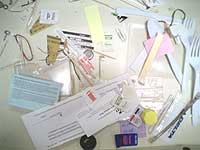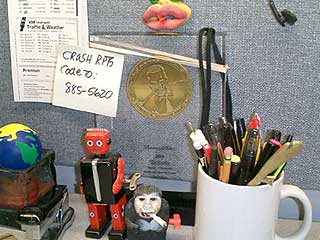I’ve been corresponding with a few political bloggers who I chided for being anonymous. Because, they explained, their ideas are so controversial, so inflammatory, so powerful… they risk their jobs or worse if they sign their names. But –they insist- they aren’t anonymous. They are “pseudonymous.” I had to look it up in the dictionary:
pseudonymous – writing or written under a false name
anonymous – not identified by name, of unknown name
So, if I write something and don’t sign any name to it, that’s anonymous. And if I sign a false name, that’s pseudonymous. Yes? Is this a distinction without a difference? Or, if I sign my letters “The Shadow,” readers won’t know who I am but they’ll know the letter was written by someone who calls himself “The Shadow.” And if I don’t sign the letter at all, the reader will have no way of knowing subsequent letters were written by the same person. Is that it?
I went to two of the smartest people I know for clarification. First, Bob Priddy, a long-time broadcast journalist and author:
“One hides behind a fake name. The other hides behind no name. Steve is a name. Anonymous is a word.
It’s the difference between hiding behind a red curtain or hiding behind a blue curtain. I suppose those who use pen names do so because they don’t want to be anonymous. It’s much more rewarding to hear people discussing who Howard Beale is than it is to hear people discussing who anonymous is because anonymous can be anybody and Howard Beale is somebody. Nobody discusses anonymous. Everybody discusses Howard Beale and therefore the sniper feels some kind of importance. Both are gutless but one is gutless with an ego.
My friend Kay Henderson (also a journalist) wrote this:
“I have never heard or seen the word “pseudonymous” before. Interesting. My first thought was of George Eliot who wrote under the male pseudonym because writing, at the time, was a “male profession.” My second thought was “Primary Colors” was written by “Anonymous” as you’ll recall.
I may be behind the times here, though. Is “Alice Cooper” or “Marilyn Manson” a pseudonym? How about “Madonna” or “Cher” or “Diddy” or “Snoop Dog” or any number of professional athletes who adopt a stage name? Our culture has grown so used to people who adopt another name/character/stage name in public that perhaps it’s not that much of a stretch to expect it to happen on-line.
Is political “speech” subject to different standards than are considered the norm for the rest of the culture? I will agree with my colleague that the cloak of a pseudonym is too often used by bloggers. But who will be the blogger police? Perhaps it will take something akin to pulling back the curtain and having Dorothy expose The Wizard to change the on-line culture. Perhaps more sites will forbid “anonymous” posting in the comments sections. I find the requirement of a name, however, laughable in most instances if you read the “names” which are used.”
I suspect we got such passionate response to this because the phantom bloggers would like to be out. No doubt all of their friends know of their secret identities (“That ‘Howard Beale’ guy? That’s me. Seriously.”). Questioning their ethics or courage stings. I’ll try to stop.



 A surprising number of people who were there on my first day are still with the company: Clyde, Roger, Charlie, Bob Priddy, Derry (no longer technically part of Learfield but always in my head and my heart), Greg, Clarice, Joyce… who am I missing?
A surprising number of people who were there on my first day are still with the company: Clyde, Roger, Charlie, Bob Priddy, Derry (no longer technically part of Learfield but always in my head and my heart), Greg, Clarice, Joyce… who am I missing?
